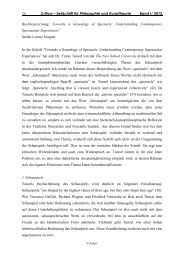Band I/ 2013 (6,7mb) - critica – zeitschrift für philosophie ...
Band I/ 2013 (6,7mb) - critica – zeitschrift für philosophie ...
Band I/ 2013 (6,7mb) - critica – zeitschrift für philosophie ...
Sie wollen auch ein ePaper? Erhöhen Sie die Reichweite Ihrer Titel.
YUMPU macht aus Druck-PDFs automatisch weboptimierte ePaper, die Google liebt.
45 CRITICA<strong>–</strong>ZPK I | 13<br />
distinction between actual, vivid consciousness<br />
and representations it might possess and evolve.<br />
Further, collective representation(s), in the sense<br />
of being reached by summing up any individual<br />
contribution of similar kind, are different and to<br />
distinctively separate from any consciousness,<br />
forming a real entity and comprising a plurality<br />
of people, spontaneously instantiated by a group,<br />
a faction of the population or even a nation (which<br />
generally designated the limits of his investigation<br />
and, accordingly, his reliance upon collective<br />
consciousness). Besides, the class is generally not<br />
pre-setting his lens, but, as a presupposition, generality<br />
and collectivity should possess both a different<br />
logical standing as well as origin still to be<br />
explained.<br />
Significantly, this real entity, if not a sociological<br />
theorem in the sense of a ficticious unit conceived<br />
of and used for the analysis and description by<br />
means of imposed threads of delineation that<br />
have to be pursued in order to follow and manifest<br />
the thoughts, the behavior, and the latent or<br />
obvious gestures of peculiar people being merged<br />
to their societal entity, is also shaping the philosophical<br />
problem: How should a real entity of consciousness<br />
exist by itself, i.e. not depending on<br />
actual perception and being driven by individual<br />
motivation (in the real, simple and constitutive<br />
sense) in order to be able to exert a special pressure,<br />
the “contrainte,” on its complementary part,<br />
the individual one, sole investigation of common<br />
and classical philosophy? In comparison to the<br />
traditional ontological question, not only things,<br />
unless perceived or not, are <strong>critica</strong>l, but with good<br />
reason one must query further as to whether any<br />
consciousness, and in particular that form by<br />
means of which a collective sample must assemble<br />
and essentially fuse, is still obstant and coexisting<br />
under circumstances where, as a token of<br />
individual consciousness, (i) actual perception is<br />
taken away by any other perception or thought (or<br />
even within sleep); or, a step further, (ii) is still accompanying<br />
and/or parallelizing any instance of<br />
distinct self-consciousness which otherwise, if<br />
the standard claim is correct, should be able to run<br />
along the whole delineation. As the philosophical<br />
question par excellence since Kant, to the extent, it<br />
did not charge, and especially not discard the Durkheimian<br />
opposition. Yet on the whole one has<br />
to involve it in order to be able to pass through<br />
both claims: That collective consciousness, its<br />
very pole, accompanies the individual in a <strong>critica</strong>l<br />
sense quite in the same manner as distinct selfconsciousness<br />
is capable of, according to the classical<br />
reading. In this context and not to overlook,<br />
one must not confuse collective consciousness<br />
with intersubjectivity, which in the meantime has<br />
received important interpretations regarding the<br />
transcendence of alterity, including a Husserlian<br />
linkage to social understanding of phenomenological<br />
consciousness in later writings. 12 The main<br />
understanding of intersubjectivity does not take<br />
its departure from the real division and polar divisibility<br />
of consciousness; where, in comparison,<br />
on one side the ›I‹ (absolved from absolute standing)<br />
must reside unfolding its layers of intentionalities<br />
against the other side realized by several<br />
kinds and/or degrees of fusion of the collective<br />
counterpart. According to Durkheim, it must express<br />
an overall social constraint on the individual<br />
one equivalent to the philosophical I and which,<br />
by reason of self-fusion too (inserted here, and<br />
taken seriously, i.e. not to mix with confusion), has<br />
darkened the reception but cannot totally suspend<br />
the existence of the divisibility.<br />
II<br />
So far, the topic, a query for musical meaning, has<br />
passed over to the side where the conditions are<br />
ruling. In addition, it has relied upon the polar<br />
opposition as the explanation of the cardinal relationship,<br />
why the general and the collective are<br />
quite different and why fusion (as the constitutive<br />
part of focus) plays a crucial part on both sides of<br />
the opposition. Concerning his reception, a <strong>critica</strong>l<br />
author like Adorno, not willing to subscribe to<br />
the ‘phantom’ of positivism or method of ‘pure’<br />
objectivization (leaving the question of the subjective<br />
contribution aside or even embezzled),<br />
promptly answered to the question with an all-encompassing<br />
rebuttal, that it represents the failure<br />
12 See Zahavi, Subjectivity and Selfhood. Investigating the<br />
First. Person Perspective. Cambridge: MIT Press 2005,<br />
ch.6, 174.




